C.L. Walters's Blog, page 5
November 2, 2022
Sci-Fi Romance Cross Genre: New Chapter
If you’ve been following me for any length of time, about three years ago (end of 2019) I asked my followers to choose two genres they wanted me to mash-up for a story. Based on that vote, what resulted was a sci fi-romance called The Ring Academy: The Trials of Imogene Sol which was published chapter by chapter in my newsletter in 2021.
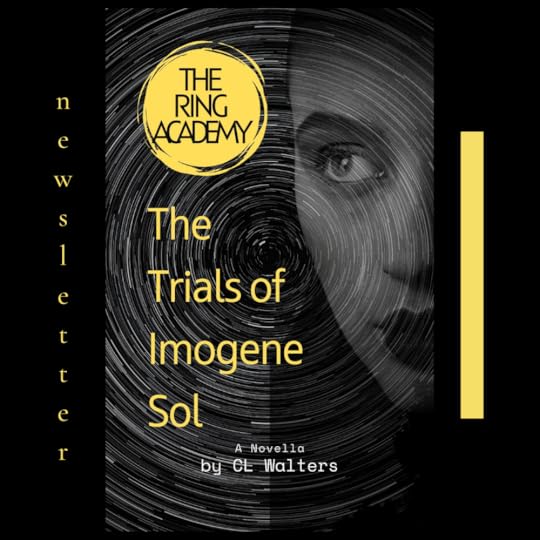
The original cover art I used in my newsletter for the novella.
It’s more space opera, less sci-fi, but I liked the story and decided to rework the novella by putting it through the indie author paces with a rewrite, a professional edit, format, and professional cover in order to publish it wider. The cover will be revealed on November 8—a cover my Patreon and newsletter subscribers selected as their favorite!
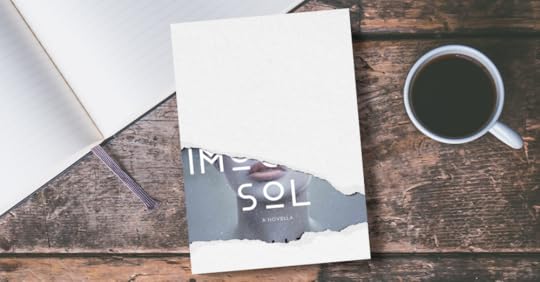
Cover coming soon!
If you want to read the original novel before any changes have been made click the button below (it will direct you to sign up for my newsletter first).
The Trials of Imogene Sol, Original novellaFor fun, I thought I’d offer a snippet of what I’ve been working on which will be new for everyone… Excited to bring you this story, August 1, 2023.
Chapter One: Focus on the Right ThingImogene raced across the room to grab the staff leaning against the wall, her opponent just steps behind her. The zip of his staff buzzed the air near her head as she ducked, rolled, and grasped the staff she needed. Her back to the wall, she turned, crouched as she threw up the staff, blocking the one being wielded at her. The clack of his weapon against hers vibrated up her arm into her elbow, jarring her teeth, but she ignored the discomfort, and shot forward.
“That’s all you’ve got?” She smirked at her opponent.
Vempur, his stark, black hair curling against his umber-toned temple with sweat, growled, showing his sharp incisors and jabbed the end of the staff toward her face. His eyes, usually a golden brown flecked with sparkles of green, turned completely black as he swung.
She blocked and went for a jab.
Vempur parried, then swung the staff at her head, once more with a loud grunt and frustrated huff. “You’re too quick,” he snapped.
Imogene smiled at her best friend, but subdued the laugh. She knew he wouldn’t take it well in the middle of a fight. Not with everyone watching. Their silent, judgemental gazes were enough of a deterrent to keep Vempur’s temper in check. Besides, she wouldn’t have appreciated his humor at the moment either. There was too much on the line. “You’re stronger, taller” she grunted out as she ducked once more. It wasn’t to feed his ego. “Find my weakness.”
“What fucking weakness,” he snapped, frustrated more with himself than her it would seem.
Imogene rocked back, arching as the staff narrowly missed her, then swung her stick out catching Vempur’s feet. He jumped, and brought his bow down to the mat barely missing her back as she rolled out from under his strike.
“Stars!” Halo Mins yelled across the sparring room. “It shouldn’t look like a dance. It should look like a fight. Stop playing with each other.”
Several of the other year sevens in the room snickered, and she knew it was at them not with them.
“Shit“ Imogene swore, resetting as she hopped away. “He’s going to knock me down.”
“He won’t. He can’t. “ Vempur jabbed and Imogene blocked the stick. They pushed against one another, locked a moment and rested for a beat. “You’re kicking my ass.”
She pushed, used her momentum to twist, swung the pole wide, and caught Vempur’s ankles. He fell, his giant frame slamming against the mat, and she went in for the kill, feigning a jab into his throat.
Vempur opened his hands against his bow staff in supplication, and frowned. “Everyone knows you belong on the leaderboard, Imogene.”
“You’re partial.”
“Sol! Neiklot! That wasn’t good enough!” Mins yelled. “If your trial was using the staff, you’d fail. But an audience would stand and clap for your riveting performance.”
It was safe to say, Halo Mins was angry. Then again, Imogene couldn’t think of a time when he wasn’t. The sight of her set him off, as her name set off so many when they met her. She probably should have changed her name, only she couldn’t until she achieved legal status as a federation employee.
Imogene widened her eyes at Vempur and extended her hand to help him to his feet. At his full height, he was at least a foot taller, her head only to his shoulder. An unlikely pair, she knew, but they’d found one another anyway. They both turned to look at Mins who stalked across the mat toward them. The rest of the year sevens in their course section watched with feral gazes, relishing her chastisement. It had been that way since her first year when they learned her name was Sol, and all the jaded history attached to it. She supposed in their shoes, had she lost a loved one because of what their parents did, she might feel the same. As a year one, their hatred had manifested into things like running into her in the hall, stealing things, refusing to be her partner. Now, though, she and all her classmates were in their seventh year. Twenty-two seemed like an age of maturity. Seven years they’d been together at the Academy. Seven years to prove her worth, her mettle, her loyalty, and still their hatred hadn’t changed all that much. Some had come around. Most ignored her. Some worked hard to undermine her with halos. And the worst offered her their open hostility and worked to undermine her so she was in her rightful place. They might have aged, but that didn’t take away their hurt and anger.
“Sir, how often do you think we’ll be in a real-life situation having to use the staff?” Imogene asked. “It’s peacetime.”
The halo’s eyes widened with incredulity. “Are you kidding me, Sol?”
She shrugged rather than say no.
Someone snickered across the room, drawing her gaze. She wasn’t sure who. She wondered if it was someone on the leaderboard with her. There were twenty-five of them—four in this class including herself. She was on the cusp of slipping below the top five, with only a point between her and Dwellen Ridig in sixth place. Slipping below five and making way for Dwellen—one of those hostiles—felt like a death sentence.
Her eyes skimmed over Malcolm Kade—number three on the board—his dark gaze intense as he watched, and his expression unreadable. Imogene pressed her teeth together and looked away, hating that she couldn’t read him. She was also sure he was relishing her admonishment, as usual. They’d been competing since the first year, though truthfully, he’d never been openly hostile like Dwellen, just reserved and standoffish.
“I don’t care if you use a slaggin’ spoon, Sol! You will leave my class knowing how to use any weapon at your disposal whether you need it or not.”
She straightened. “Yes, sir!” Besides the staff, they’d used twin daggers, knives, and a rope. With the trials coming up, the review was necessary. Today, she’d gained the upper hand for each of them. Some by skill, but also by her wily ways and sheer tenacity. She couldn’t afford to be knocked from her spot on the leaderboard. She needed it because her life in the federation depended on it.
“Because of your impertinence–” Mins turned away from her and Vempur– “Anyone think they can best Sol today?”
“Using the staff, Halo?” someone asked—she was sure it was Dwellen, and knew he’d jump at the chance, though maybe not with that weapon.
Mins looked over his shoulder at her and smirked. “Your choice.”
“I’ll do it,” a voice rang out, quickly.
Imogene wanted to close her eyes, recognizing it. Of course Kade volunteered. She pressed her teeth together, tightening her jaw, but kept her face even and hopefully as unreadable as he did.
“Excellent!” Halo Mins clapped his hands together. “Choice?”
“Hand-to-hand. No weapon.”
Imogene refrained from rolling her eyes.
“This will be our last fight for today. Let’s see if you can make it 5 and 0, shall we Sol?”
Imogene watched Vempur cross the mat back to the rest of the year sevens, While Kade stepped onto it, drawing his dark hair away from his face with a band. She refused to allow herself to linger on the handsome aspect of his face or the width of his muscular shoulders, or the sinew of his arms, or the grace with which his body moved. Who was she kidding? She was lying to herself that she didn’t notice. Of course she noticed. She was a living, breathing woman after all. It was maddening.
“Gear sir?” Kade asked.
“No. Let’s make it interesting.”
“But–” Kade’s thick brow collapsed over his dark eyes. “That’s–”
Mins raised a hand to silence Kade. “Sol can take it.” The Halo challenged her with a look and waited for her to admit she couldn't, but Imogene refused to admit that. The Halo would use it against her somehow, deduct her points which would impact her rank. His grin widened when she didn’t respond, and he said, “Ares rules apply. Take-downs only, a point for each. No face punches or low blows. First to three wins.”
Imogene rolled her neck and got into her stance. Kade mirrored her and she couldn’t help but admire him, objectively of course. She certainly couldn’t admire him in any other capacity. He was taller than her. Not quite as tall as Vempur, but close enough which made his reach dangerous. She knew she was quick but no match for his size and strength. She glared at him, knowing he’d picked hand-to-hand because it would be the easiest way to beat her.
“Something wrong, Imogene?” he asked, his motives for asking it concealed. Was he just trying to rile her up?
She couldn’t be sure, so she said, “Nope,” with a polite if reserved smile.
“Oh!” Mins interrupted.
Imogene glanced at the teacher, who was now standing across the room with the students.
“Whoever loses gets a deduction.” He crossed his arms with a self-satisfied smirk on his face.
Fuck, Fuck, Imogene swore to herself and glanced at Vempur with a see-I-told-you-so look. She couldn’t lose, only her heart sped up and her brain began to spin with trepidation. She swallowed and made the mistake of looking at Kade. His facial expression shuddered and indecipherable once more.
Then Mins yelled, “Fight.”
Coming August 1, 2023October 26, 2022
Contest Awarded Short Story: The Invalid

Back in September I entered a short story I’d written in Ghost Story and Horror contest at www.indieitpress.com . And guess what?!?! It placed! 5th. I’m proud of it. Is it horror? It’s horrifying. LOL.
I’m dropping a link to it, in case you want to read it. It’s disturbing, so be forewarned that it might be triggering.
The InvalidIf you don’t want any spoilers…. better stop reading.
.
.
.
.
Okay . . . a bit behind the scenes: I wrote a snippet of this story a long time ago. Which part? About a paragraph when the main character, Tom, collapses. I had an idea for the story, but hadn’t ever finished it, so when the contest rolled around, I wondered if I might use it to motivate me to finally write it.
“The Invalid” is a dive into the mind of a man who’s suffered a stroke and can’t communicate with his surviving children. The horrifying part of the story is that Tom wants to tell his children he’s sorry for all the horrific things he put them through as they grew up, but now he can’t. Their anger at him is palpable, and justifiably so. Of course, things aren’t exactly what they seem, leading the reader to a twist at the end.
I enjoyed pushing myself creatively to write outside my genre. While challenging, it pushed me to consider writing choices that I might not have otherwise when writing a romance, but also made me think about the same tools in a new way: tension, conflict, characterization. It was a fun way to expand my own craft.
I’d love to know what you thought about the story!
October 13, 2022
The WHY Behind The Messy Truth About Love
The Messy Truth About Love has been out for over a month now and I waited to write this post to avoid any spoilers, but I think its safe to explore this topic further without harming your reading experience. But in case you want to read The Messy Truth About Love without them, then probably stop reading NOW.
Here are the trigger warnings, just in case you need them
Ready to read more behind-the-scenes? Scroll for more…
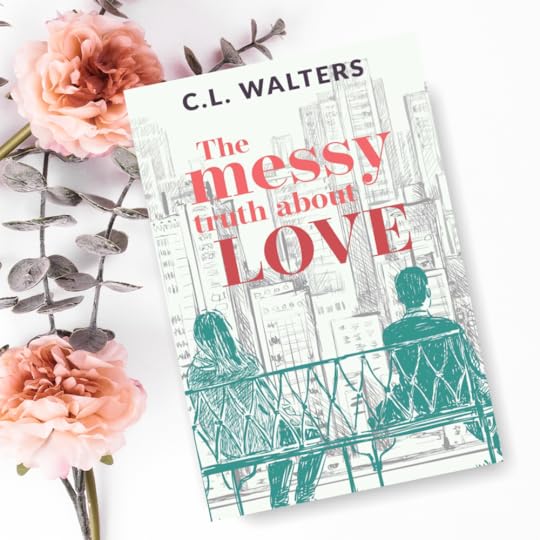
When I set out to write The Messy Truth About Love, I had no idea that it was going to dive into an abusive relationship. In fact, since I was writing about Seth (a reoccurring character from The Ugly Truth) I thought his mental health recovery in the midst of his own childhood abuse situation would be as dark as I dove. Only Hannah made me look closer at her relationship with her ex-boyfriend, Sebastian. And suddenly, I was researching abusive relationships and the warning signs.
I’d planned to publish the following “Author’s Note” here, but before I did, in a fortuitous convergence of events, I was listening to a recent episode of Crime Junkies Podcast that aligned with my own purpose. It was the story of Yeardley Love.
Yeardley was a fourth-year college lacrosse player when her life was cut short in a domestic violence event. Her on-and-off-again boyfriend, also a fourth year college lacrosse player, in a fit of drunken rage, attacked her, killing her. He was arrested, found guilty of 2nd degree murder, and sentenced to 23 years in prison. That can’t bring back Yeardley to her loved ones, but they sought to honor her memory. In order to combat the pervasive way domestic violence haunts our society, Yeardley’s family started the One Love Foundation to offer education and support, specifically to college students, as they navigate their relationships. I plan on supporting with a portion of the proceeds from The Messy Truth About Love.
Here’s why (from my Author’s Note):
In 2020 the #blackandwhite challenge circulated on social media. Women posted a black and white picture of themselves to highlight empowered women, only I remember learning after the fact that the impetus of the black and white photos got lost as if we were playing a game of telephone. The origin of that particular “challenge” was rooted in Turkey when women woke up to yet another black and white photo in the newspaper of another murdered woman. This time it was of Pinar Gultekin, a 27-year-old Turkish woman who’d been murdered—strangled, burned, then buried in concrete—by her ex-boyfriend in what was called an “honour killing.” Why? Because she told him “No.” Because she didn’t want to date him. Because she had moved on, he hadn’t and decided to choose for her. The unfortunate reality is that Gultekin’s photo in the newspaper was one of many black and white photos of murdered women in Turkey. Fed up and needing a way to fight back, Turkish women created the black and white photo reminder to increase awareness about the horrifically high femicide rates, specifically in Turkey, at the hands of their intimate partners.
They wanted change.
Pilar Gulekin’s story might have appeared in black and white—a photo and words on the page—but her life was lived in color, in a collection of experiences and relationships that made her a real human. Just like the many other stories and statistics we’re able to access in black and white, but rarely offer the color image.
Consider these black and white statistics from the United Nations and the World Health Organization:
Of the approximately 3.9 billion women in the world, over 736 million of them have been subjected to physical or sexual violence in their lifetime. It roughly estimates to 1 in 3 women though this statistic doesn’t include sexual harassment.
Most violence against women is committed by intimate partners or former husbands, and for those women who have been in an intimate relationship, 16% of those women will experience violence perpetrated by their partner against them.
In 2020, 81,000 women and girls were killed, and over half of those were at the hands of their intimate partner or other family member (and that’s only the ones we know about).
Less than 40% of women who experience violence at the hands of family or an intimate partner seek help, and less than 10% of those reach out to law enforcement.
Globally, violence against women disproportionately affects women in lower-middle- income situations.
I’m a fan of Crime Junkies (the true-crime podcast) and watching true crime documentaries. I’m not exactly sure why that is, though due to their popularity, I know I’m not alone. Though many of these stories shared offer context and work to flesh out the truth for the victim, I wonder if they provide the listener with a voyeuristic ability to stand outside of it. As if we’re passing by a terrible car accident and need to see the gruesome reality but sigh with relief that it didn’t include us. What gets to me about these stories: most of the cases are crimes against women. I wish I was surprised by this, but the unfortunate (and frighteningly pervasive attitude) is that violence against women is the norm, and worse, the undercurrent that somehow it was probably her fault.
No one does black and white voyeurism better than Americans. We’re great about looking at a black and white photo of a woman who’s been murdered in Turkey and distancing ourselves from it. It isn’t in our country, right?
Except there are black and white statistics that say it is. A study done by Asher and Lyric about women traveling on their own in the world and how they might consider their safety relative to various locations in the world. Asher and Lyric ranked the countries using datapoints that examined things like “walking alone at night,” the country’s “homicide rates against women,” “nonpartner sexual violence,” and “partner sexual violence,” as well as “attitudes about women and violence against women in general.” Out of the 50 countries examined, want to know where the United States lined up? Nineteenth with a C- sandwiched between Tunisia and Ukraine. And get this, the United States ranked 7th highest for intimate partner violence (Only Brazil, Morocco, India, Thailand, Turkey, and Chile ranked higher in that category). Turkey was 5th.
Take that in for a moment. Turkey—where Pilar Gultekin was killed for telling her former boyfriend “no”—was only two spots higher than the United States.
We want to distance ourselves and claim that kind of violence doesn’t happen in the United States, but those black and white statistics don’t lie, those black and white photos in newspapers, and the words written to offer the latest true-crime story offer us surface level truth. We look closer—and every single one of us should be looking closer—tell us a deeper truth. Each of those faces, every single one of those names, and every statistic is linked to a full-color story. Like Yeardley Love.
Hannah’s experience in The Messy Truth About Love is meant to showcase the subversive way abuse occurs in an intimate partnership. I’m going to go out on a limb and make the claim that women don’t walk into a relationship thinking it will be or become abusive. Then once immersed in that situation, getting out of it isn’t a black and white solution of just walking away (even if we’d like it to be). How does one leave without financial stability? What if there are children? Does she have supportive friends and family to help her? What if she goes to school with her abuser, like Hannah? And even if a woman leaves, what if their partner doesn’t get the message? What if he doesn’t adhere to the law? Or what if there aren’t any laws to protect her?
Hannah’s experience in this story is mild (I needed a positive and hopeful ending, folks). She’s a singular perspective. The truth is that the women most adversely affected by these black and white statistics are women of color, women immersed in low socio-economic circumstances, trans women. I can’t trivialize women’s experiences to say that their stories all wind up hopeful and positive like Hannah’s. There are too many cold-case files, too many murders, too many statistics, too many young children without mothers, too many stories to say that women’s stories aren’t happy or hopeful. It’s heartbreaking.
I need hope.
And yet, I don’t have anything very hopeful to offer with respect to this issue. I don’t have that glimmer of light to say: “Look! We can get better.” Only after I wrote this, our nation’s highest court overturned the landmark Roe versus Wade reversing women’s bodily autonomy. So my hope meter feels like it’s running a little low. Why? While body rights may seem a separate issue from intimate partner violence, they aren’t that disparate. Both issues communicate an attitude about women and where her agency lies, both of which say it’s outside of her own autonomy and in the hands of someone else. As Americans we want to distance ourselves and say intimate partner violence isn’t an American problem, but it is. It’s a national problem. It’s a global problem.
If you are a woman in trouble, please reach out. Here are some national resources for you:
https://www.thehotline.org/ or 1-800-799-SAFE (7233)
https://www.rainn.org/ or 1-800-656-HOPE (4673)
https://www.joinonelove.org/ (a great resources to temperature check your own relationship. There’s an app as well and everything is confidential.
Please call 9-1-1 if you are in immediate danger
September 14, 2022
Creativity Inspired: A Haunted Story
This week I’ve been following an instagram challenge (called the 1wordpromptchallenge created by @mjvaughn1_author) that offers a single word to inspire that particular day’s post. Several years ago, I participated, and the process inspired two new books, one of which was The Stories Stars Tell. Since I’m between projects, I thought I would participate again to get that creativity moving. Here’s the posts for the last 4 days combined into one piece. The words were punish, uncover, plaster, and disrespect:

The attic door opened with a horrific creak as if its bones were breaking. Layers of dust rained down, and I ducked my head, squeezing my eyes shut to keep anything from getting inside them. With a cough I waved a hand back and forth in front of my face.
“What is it?”
I glanced over my shoulder at my younger brother—by seven minutes—behind me. “Does it look like I’ved done anything more than pop the attic opening?” Sometimes he was exasperating—so scared of everything—but then I couldn’t blame him. Not really. There was a lot to be scared of in the world, and we knew it better than anyone.
“You don’t have to be a jerk, Rue,” he muttered. “This is going to trigger my asthma.”
I sighed. “Cover your mouth and nose with your t-shirt. I’ll climb up and see what’s up there, grab something, then we can take it back.” I unfolded the old ladder, the joints of which required a bit of extra tugging to get it unfolded and moving again.
We actually weren’t supposed to be in the house at all. Mom’s orders. Only Forrest—our older brother—dared us, and despite Ren’s best effort to play it off and keep us cooped in at the apartment, I couldn’t back down from a challenge. It hadn’t helped that Forrest had been playing video games with his friends Kenji and Will—and I thought they were both really cute though Kenji had the edge on Will.
“Bring me a trinket from the attic,” Forrest said, his game paused as he goaded us—well me anyway—into taking on the challenge. As summer stretched slowly toward the first days of sophomore year, boredom had kicked in. The idea of sneaking into the old house to do some exploring sounded like an intriguing way to pass some time.
Ren had followed me, because he always did. When we’d snuck in through a loose board near the back door, he’d insisted we could take anything really. “Forrest will never know.”
“I will!” I’d said and moved deeper into the dark house, the flashlight swishing back and forth as dust motes filtered the light.
Now, as we stood in an upstairs hall at the ladder looking up into the even darker space of the attic, Ren said, “I want to go on record that I still think this is a bad idea.”
“You already went on record,” I replied.
“Mom’s going to be pissed that we're here at all. And that ladder doesn’t look sturdy. And when if you get a horrible bout of allergies–”
“Mom doesn’t have to know–”
“She will if you fall and break a bone. And if I break one because you’ve fallen on me. I don’t feel like being punished for the rest of the summer.”

“Why doesn’t Mom want us in the house?” I asked.
This, of course, was the strangest demand to me.
The house—hundreds of years old—was a plot of land tucked back into a copse of trees from which our family had never strayed. Though no one in the family had lived on the lot or in the house for at least a generation. Grandma Lily claimed it was because the house was unfit for habitation. “Falling apart,” she’d said.
“Why hasn’t anyone sold it?” I’d asked.
“There’s a provision,” she’d said.
Truthfully, that’s all anyone said. “There’s a provision.”
“In the will?” I’d asked Mom at dinner a few weeks ago. “That’s what everyone says. There’s a provision.’”
She’d looked at me, tilted her head a moment and then said, “Yes. Exactly.”
Only I knew she was lying. I wasn’t sure exactly how, but it was clear enough.
My fascination with the house began back when I was around ten. And at the same time Ren developed his aversion to it. I was prone to asking Grandma about it because she’d lived there until she’d been about five. But getting her to share anything about that time was like trying to dig for treasure. “I don’t remember,” she’d said, only when she’d slid toward the twilight of her life, she began to let clues slip.
The house—Ivy Manor as it was technically called—had been built nearly two hundred years prior. Some ancestor back in the dark ages of colonialism staked the land, then passed it down through generations. And though it had been home to many, not a soul had lived in it since my grandmother was a girl. It hadn’t been sold.
The first time Ren and I snuck in, we’d been thirteen. It was like a dusty, musty museum, everything still in its place as if the family had just walked out the door and locked it behind them. The furniture was coated with dust. Trinkets covered shelves layered with grime so thick, it was knuckle deep in some places. A piano tucked into an alcove near the stairs was warped and most of the keys wouldn’t even play a note. Then there were the picture frames of frowning strangers.
Everything about Ivy Manor was a mystery, one I wanted to uncover. But Ren was content to let this mystery remain one.
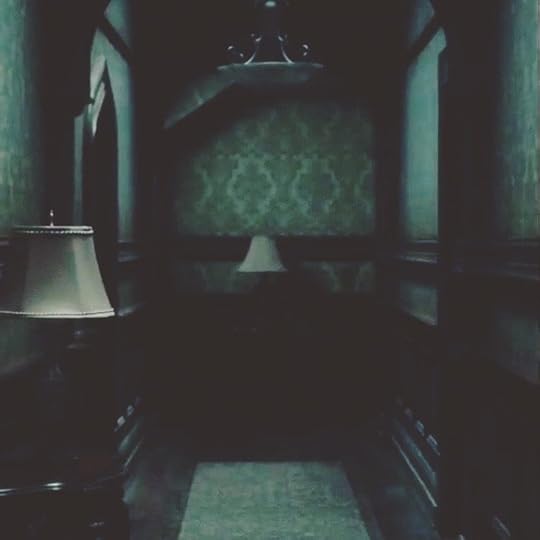
The first step up onto the ladder cracked under my weight—
“Rue!” Ren shouted.
My shirt tightened around my chest and neck as I flew backward into my brother’s arms, my back plastered against his skinny chest. He’d yanked me back against him, protecting me as usual, his arms tightening around me.
“Please, Rue. I don’t think you should go up there.”
I straightened, spinning to look at him. Though we were fraternal twins, everyone said we looked alike. Dark hair, dark eyes, freckles sprinkled across our cheeks and noses. There were impressions of our older brother, Forrest, in Ren’s features hinting at how he might look when he was eighteen: large eyes framed with long dark lashes, full dark eyebrows that made him look broody, and high cheekbones. His nose was a bit delicate and its triangle shape made Ren appear kind, which he was. Everyone said we looked so much like our dad.
It pained me to think of him.
“Why are you so jumpy.”
“Have you ever thought there’s a freaking reason Mom has told us to stay away?” His dark brows crashed between his eyes. “A reason that Grandma Lily left as a girl and why the family hasn’t ever sold it?”
I shrugged. “Sure. But don’t tell me you believe in like haunted shit, Ren.”
“It isn’t about whether I believe, Rue–” he said my name like an accusation– “but rather understanding the why behind it all.”
I looked up at the black hole in the ceiling, longing to climb the ladder and inspect the space overhead, but there was a part of me that knew Ren was right. Sure he might have been the overly cautious twin, but he’d been pretty good at keeping us alive. Whereas I would have had us in the hospital probably more times than I had fingers. I looked back at him. “Fine.”
He took a giant breath. “Just grab something else.”
“Fine, but I swear, if Forrest says anything, I’m blaming you.”
“Acceptable.”
I refolded the ladder, its groaning loud as I pushed the hatch back up with a thud.
When I turned toward Ren, wiping my hands on my shorts, he was looking over my shoulder, his eyes giant, and his face pale. “What is it?” I asked.
But he didn’t answer. His face didn’t move, his mouth frozen in a terrified grimace. Everything about him was petrified with fear. I couldn’t even tell that he was breathing.
“Ren?” I whispered, reaching for my brother and grabbing hold of his arms to shake him.
My heartbeat elevated in my chest, to terrified to turn and look at what Ren was staring at behind me.

Chills raced up my spine knowing that whatever Ren was fixated on had him catatonic. Rather than paralyze myself by looking, I pushed against my brother's chest to get him moving. Saving him from whatever had him locked up was the priority. “Move,” I shouted.
A cold feeling slipped up my spine like dry, bony fingertips, and I shivered.
“Move!” I screamed, but my brother seemed stuck.. “Ren!” I shook him.
He blinked, turning his head to look at me, as if resetting his brain, then grabbed my hand. “Run!”
We raced down the hallway, took the narrow stairwell several stairs at a time, and shot out into the formal foyer of the old house. Even as fast as we were running, however, those cold impressions lingered against my skin. In my ear I heard my name breathed, beckoning me to turn around, “Rue–”
“Hurry!” I yelled, pushing against my brother and refusing to look over my shoulder.
“I see you,” the cold whisper murmured in my ear. “I see you both.”
Ren jerked me through the kitchen to the back porch to our entrance point, shoved me through first, then followed. The board slid shut with a smack against the frame of the house, a plume of dust with it.
We scrambled back over the porch, now on our asses, breathing harshly, and watching that entry point for movement. The woods around the house were quiet, not even a breeze stirred the green leaves on the verge of turning yellow as fall knocked to be let in.
“Oh shit. Oh shit,” I chanted, my chest heaving with a mixture of exertion and terror. I wanted to squeeze my eyes shut and reset, not knowing exactly what had happened, but understanding the feral fear coursing though me was real enough. But I didn’t dare, my eyes fixed on the spot. Just in case.
“What are you doing!” a voice growled behind us at the same time a hand clamped down on my shoulder.
Ren and I screamed, flinging our hands out and connecting with whoever was behind us.
“It was a joke!” Forrest snapped, jerking back and bumping into his friends behind him. Kenji and Will exchanged glances.
“That was so disrespectful,” Ren said, and though he wasn’t crying, I could hear the tears in his voice.
“Disrespectful?” Forrest asked, then laughed. “You should see your faces.” Our older brother glanced at his friend who chuckled with him. “So worth it.”
I looked over my shoulder at the house, at the board where we’d climbed inside and then escaped whatever had been saying my name in my ear. Though I wasn’t prone to being afraid, whatever had just happened had me shaken. “There’s something in there,” I mumbled, and looked over at Ren, who’s look matched my own.
(Please note: all of the images have been taken from Pinterest from various sources).
September 13, 2022
The Messy Truth About Love is OUT!
August 24, 2022
Relationships: Isolation versus Autonomy

Storytime!
When I met my now husband, I wasn’t in the best mental space. I was a first-year college student who hadn’t left her hometown for a bunch of reasons, and ended up enrolled at her local college. A fortuitous convergence of events, really, because had it not worked out this way, I wouldn’t have met my guy. But that doesn’t mean it was smooth sailing. Nope. Both of us were willing to work through the junk in each of our individual lives (not always in pretty ways) to be together. But when we were younger and full of our insecurities, we weren’t always healthy in our approach to our own lives both on our own and together. My life became about him. His became about my adoration of him. While we didn’t display those red-flag tendencies (see graphic below), both of us potentially could have fallen into this trap.
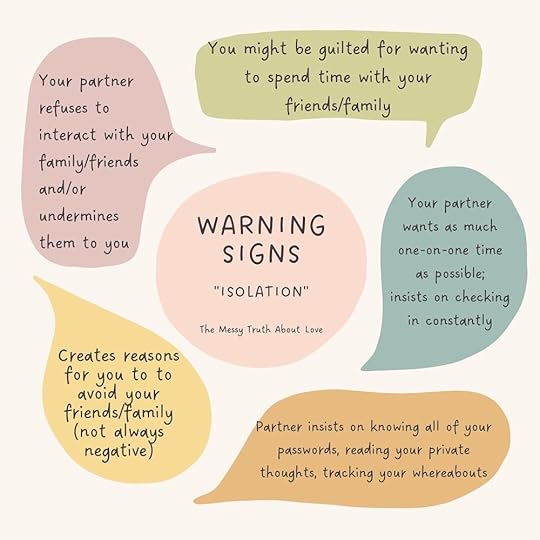
Aging is a great perspective builder. Having been together for over twenty-five years, we aren’t the same two people we were in our early twenties (thank goodness). I’m happy to report that time, education, and experience has supported us to be a better version of a couple. A healthy one (see graphic). He’s pursuing his dreams and supports me in pursuing mine (and vice versa), both of us recognize the strengths each of us bring to the relationship to make us better as a couple.


In the Messy Truth About Love, Hannah and Seth had a crush on one another in high school but other than a make-out session, that’s as far as it went. Seth mentions that being with Hannah “was like climbing a mountain he didn’t have the tools to climb.” Having been the victim of child abuse, Seth has done work on himself with therapy when he and Hannah reconnect. He’s becoming a better version of himself with access to better tools. Hannah, however, is getting out of a relationship that unfolds waving red flags at the reader. In the story when Hannah and Seth reconnect as more self-aware people, they have to work through the individual spaces in their own experiences and figure out what that looks like as a couple. It isn’t always pretty.
The Messy Truth About Love was a difficult book to write for the very reason it takes the reader into uncomfortable places in unhealthy relationships. One of the common bits of feedback I have gotten, however, is how important the story is to share. How many people who have read it mentioned they have identified in some way with the journey and wished they’d had something like this book to help them through the confusion. It isn’t a preachy book, but hopefully it’s one that provides perspective that each person has value in and of themselves beyond any relationship that they might be using to define them.
The Messy Truth About Love is available for preorder and signed copies can be purchased up to September 6. It publishes on September 6, 2022.
CLWalters Blog RSSAugust 17, 2022
Relationships: Beware Gaslighting
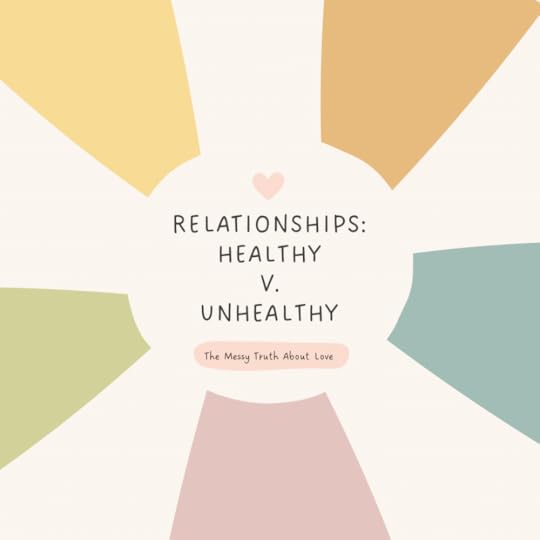
This isn’t a blog to explore the how, the what, the what-to-do with respect to gaslighting. Remember I’m not a psychologist or a therapist, just an author who’s done a bit of research for their book (Here’s a link to a resource written by someone more in-the-know than I am). The purpose of this blog is to consider gaslighting in terms of the “everyday” relationship. Ultimately, this sinister form of manipulation culminates when the victim questions their sanity, but that’s not how gaslighting begins.
Relationships are tricky creatures from the get-go. Typically two people with distinct personalities are working to come together and maintain a bond. This is difficult for two people with completely healthy approaches to relationships and communication. Add complicating factors like mental health issues, trauma and/or abuse, addictions, different perspectives, varied life experiences, so on and so forth, and the playing field went from being rolling hills to the Rocky Mountains.
Gaslighting, then, is one of those insidious tools used between partners to manipulate the other’s emotions. Like the love bomb, it isn’t necessarily something that is easily identifiable, especially when trust has been established in a relationship and if you aren’t sure what to look for. Here’s an example of how gaslighting might look in a typical relationship:
Let’s pretend you’ve had the feeling that your partner isn’t being completely honest with you about what they’ve been doing. Your spidey-senses are tingling, so you decide it's time to ask about some things you’ve noticed, at least to calm your insecurities. When you ask your partner about the late nights and the strange hushed phone call from the other night, your partner twists your questions back on you as if what you’ve made are accusations, and suddenly you’re being accused of being a liar. That perhaps you’re “making up '' mysterious phone calls and accusing your partner of being late because you’re doing something wrong while they’re away. Your partner might say, “Guilty people make accusations about what they’re doing wrong to deflect, afterall.” Your partner’s guilt trip about your lack of trust and oversensitivity throws you off since that’s not what your intentions were. Right? Maybe your partner is right. You struggle to recalibrate your thoughts, because what started as just a conversation to “clear the air” has you defending yourself, doubting your intentions and your feelings, along with doubting your instincts.
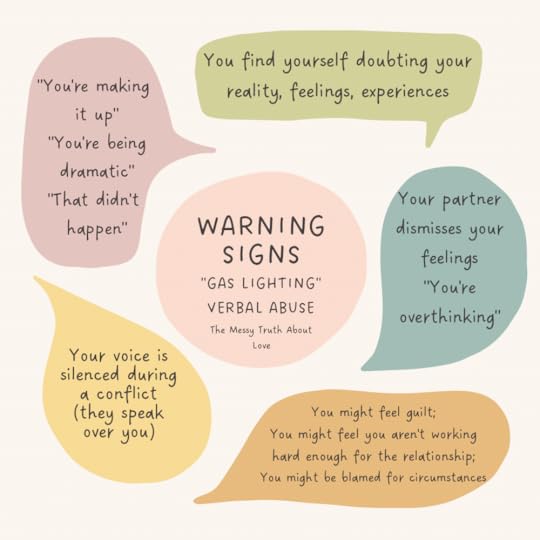
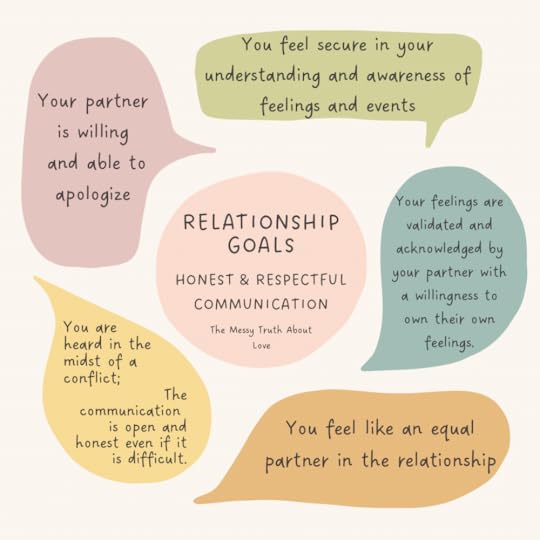
The thing is, even normal, everyday, regular people can deploy a “gaslight”. This isn’t only a tool of the shady or the narcissist or the sociopath. It is a learned tool—a form of avoidance and deflection—which makes it important to be able to identify one and call the behavior out immediately. In The Messy Truth About Love, Hannah’s ex-boyfriend used this technique, calling her “over-sensitive” and “dramatic”. The awful thing about persistent gaslighting even in a “typical” relationship is the ugly way it preys on beliefs about self, feeding on insecurities and forcing those wounds to grow and fester.
If your partner uses this tool, it's important to call it out for what it is. You might need help with this, so find help! And if your situation is abusive, seek help immediately.
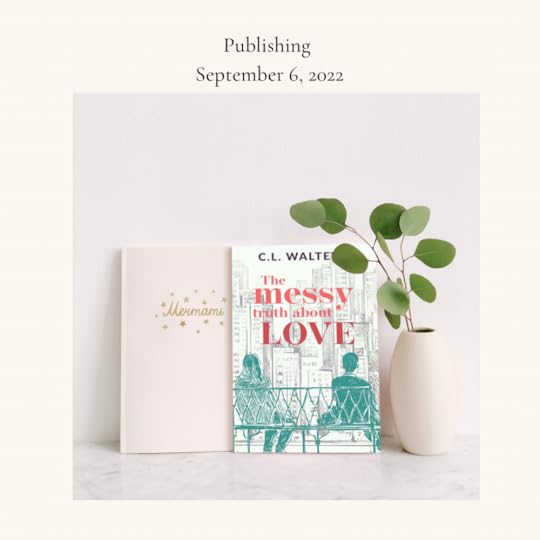 CLWalters Blog RSS
CLWalters Blog RSS
August 10, 2022
Unhealthy Relationships: The Love Bomb
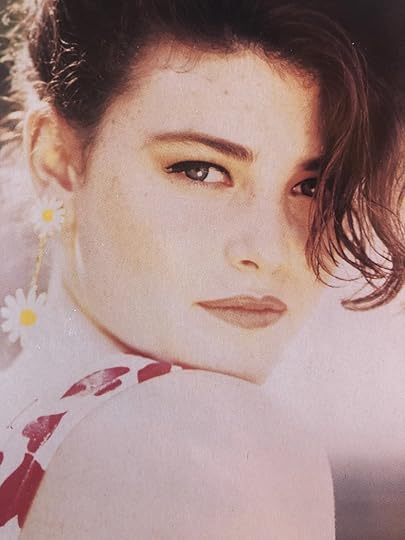
Me at 18… In hindsight, I wonder why I was so insecure.
When I was seventeen and eighteen, I was a model. I wanted to go to New York City and eventually become an actor. The truth was, however, I was very insecure in my own skin. Insecurities are totally normal, but looking back, it’s probably a good thing I didn’t follow that “dream.” My soft heart, naive understanding of the world, and insecure mindset would have been a terrible combination in a cutthroat world like that.
Those are also qualities that are easily manipulated.
When I was writing The Messy Truth About Love, I went back to this girl when I started writing Hannah. Though Hannah isn’t me (she’s a fictional character), I thought about how insecurities informed the way I interacted with the world and was curious about how that might be true for Hannah. It made me wonder: What happened to Hannah? I had to dive into Hannah’s character’s past to truly understand her present and began to see the red flags of a young woman who’d suffered through an abusive relationship. A deep dive into kinds of behaviors people might experience and not necessarily identify as a red flag to potential abuse sparked my curiosity. One red flag was waved time and again: Love bombing.
What is Love Bombing? In a nutshell, it’s the extreme romantic attention offered quickly and intensely as a means to influence feelings and is often a tactic used by narcissists to control their partners.
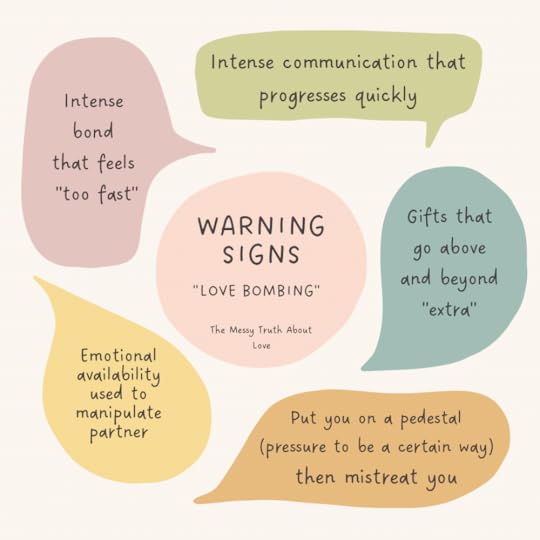
Keep in mind, I am not a psychologist or a therapist. What I’m sharing with you is what I’ve learned as a writer through research (if you feel you might be in an abusive relationship, PLEASE GET HELP IMMEDIATELY). This is a scene I wrote for The Messy Truth About Love. It ended up on the cutting room floor in final edits due to pacing issues, here’s a part of it showcasing what love bombing might look like:
The trees flew past as if they were moving, rather than the car speeding down the highway on the way toward the Oregon coast. Sebastian had planned something special for our first Valentine’s Day celebration. It was technically our fourth date, but since our first coffee date, we’d spent at least some part of everyday together the last several weeks. He made it so hard not to be crazy about him.
As if he’d read my thoughts, he reached across the center console and took my hand in his. “I’m so glad you’re here with me,” he said and smiled. “You’re the best thing that’s ever happened to me. I’m so excited for your surprise. To show you how much you mean to me.”
My heart tightened in my chest, and I squeezed his hand with mine. “Me too,” I said, offering a smile.
We rode in silence for another few miles. Sebastian sang along to the playlist he’d made. He’d titled it “Our first Valentine’s Day.”
“Do you think we’re moving too fast?” I asked.
It was only our fourth date, after all. We’d met for coffee the day after meeting in the library. I still got that warm glow remembering what he’d said, “that first time I saw you, Hannah. I wasn’t sure I’d be able to breathe again without talking to you.” I’d made a quip, and he smiled, his eyes twinkling, and said, “Good thing you talked to me.”
The second date had been to a rib place in Salem. We’d worn bibs and gotten messy faces, laughed, and talked about our lives. He’d shared about his crazy ex-girlfriend who had been ultra-controlling, and how that experience had shaped his struggle to put himself out there again. I’d shared with him that I’d never really had a boyfriend, a few near misses but several crushes, one I thought about from time to time. Sebastian had smiled and said, “lucky for me.” I kept my shame about the night my father died to myself. On that date, I’d reached out and used my thumb to clean off a spot of sauce near the corner of his mouth that he’d missed with his napkin. Sebastian’s eyes had met mine, and there was a shift between us toward something more physical. We shared our first kiss against his car before returning to his apartment to watch a movie. It was weak-kneed wonderful.
Our third date was to an art museum in Portland. We’d wandered the halls hand in hand, stopping to kiss. Sebastian snuck nips at my neck, wrapped me in his arms, held me tightly against him. “Hannah Fleming. You’ve got me all tied up in knots,” he’d said against my skin. After, as we walked back to the car, he’d pulled me into a floral shop and bought me as many bouquets of roses as I could hold. When we’d made it back to his car, he’d driven us to a park next to the river where we’d made out like teenagers, surrounded by roses. We talked about our dreams, and I walked in my apartment with him that night feeling as if it had been a dream.
(The rest of the scene is on my patreon page)
Though this kind of attention can initially seem acceptable in the intensity of a “new relationship”, attempting to identify the giver’s motives is important to ascertain their sincerity. Love bombing can lead to more problematic and abusive behaviors like gaslighting and isolation, and isn’t the only time those in a relationship might experience it. Love bombing can also occur after explosive fights or abusive episodes when the abuser desires to “smooth over” their abuse by using effusive words and actions to manipulate a victim toward “forgiveness.” One of the quickest ways to identify whether you are the victim of Love Bombing is to ask yourself if you feel manipulated.
For example:
Your partner describes you in a manner that is flattering and seems to put you on a pedestal to “worship” you. The words they use might be exactly what you need to hear, speaking to you on a very emotional level.
The Love Bomber in this instance is manipulating the emotional connection with words but also setting up future “isolation” since no one can “live up” to you.
Your partner might offer you high praise and then in the next breath belittle you to “keep it real.”
The Love Bomber isn’t about you or the relationship but rather controlling you via your emotions. This will serve to manipulate and unbalance you, feeding into your insecurities to showcase how dedicated the Love Bomber is to you.
Your partner loves public displays of affection, with social media posts or showing you off because they are so “in love” or so “lucky” to be with you.
This elaborate display for a Love Bomber is the means to present the “perfect” romance giving them the attention they crave rather and building an authentic relationship with you.
Your partner showers you with grandiose gifts. We love receiving gifts, right? These gifts come with price tags.
A Love Bomber will use the gift as a means to showcase their devotion and remind you of what they have done for you. This will make you “feel bad” for all they have done which in turn keeps you locked in the relationship.
Your partner showers you with early “I love yous” and then withdraws the affection without cause.
Remember a Love Bomber is all about manipulating your emotions. Drawing you into an intensely emotional relationship and then “leave you hanging” is a classic means of manipulation.
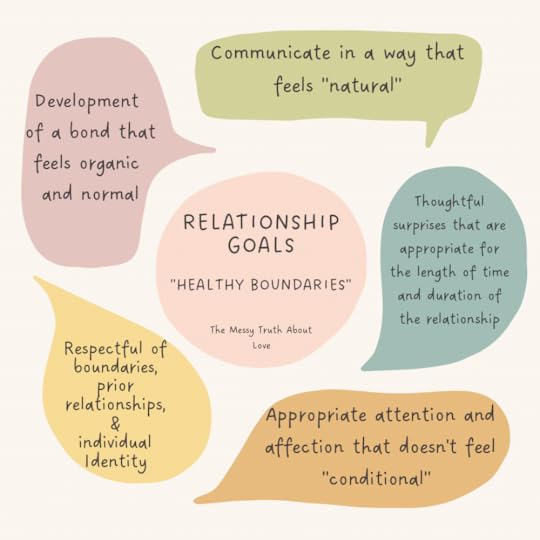
Perhaps you recognize some of the above signs in your relationship, but you aren’t sure if you’re being manipulated? Here are some questions to ask yourself:
Ask yourself: Am I comfortable with this person’s attention or is it a “bit much”?
Remember that a true Love Bomb is a manipulation tactic. If the attention feels too big and self-serving (for the giver), it probably is. Trust your instincts.
Ask yourself: Am I afraid to confront my partner for fear of their reaction?
Your desire to keep the peace might be more connected to an abusive response by your partner who might berate you, gaslight you, or guilt you.
Ask yourself: Is my partner respecting my boundaries?
A partner who ignores your boundaries isn’t offering mutual respect. For example, perhaps you told your partner you are planning a night out with your friends. Your partner agrees but on the date of the event, begins to use emotional tactics to manipulate you to not go. Or maybe you’re out and your partner shows up to “crash”. These techniques exemplify crossing boundaries.
While I can’t say I know everything about this topic, (I don’t and I’m not a psychologist or therapist which is who I urge you to discuss your experiences with) I wanted to offer some bits I learned in my research. Here are some additional resources to guide you:
Love Bombing and the Narcissist
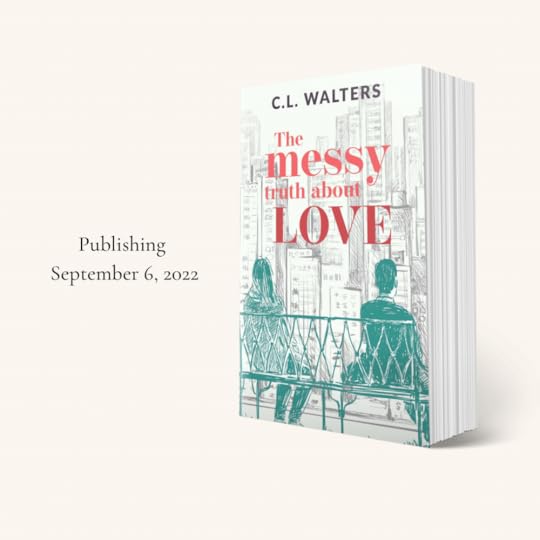 CLWalters Blog RSS
CLWalters Blog RSS
August 3, 2022
Healthy Relationships: Hindsight is 20/20
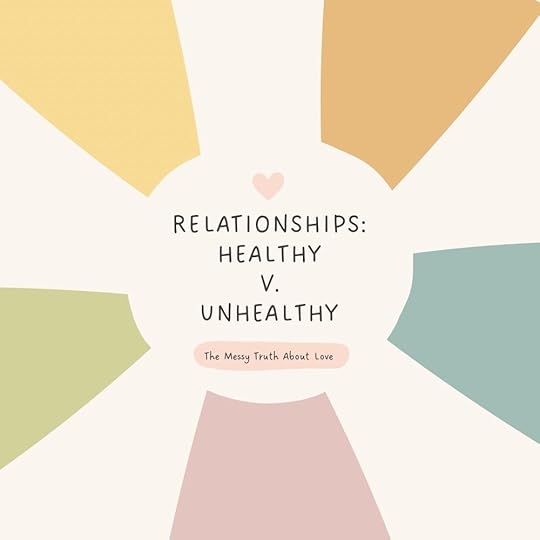
During my junior year in high school, I went through a breakup with a long-term boyfriend of over a year (which hadn’t been a very healthy relationship and is a story in and of itself). I wasn’t in a very good place emotionally and my confidence was at an all-time low.
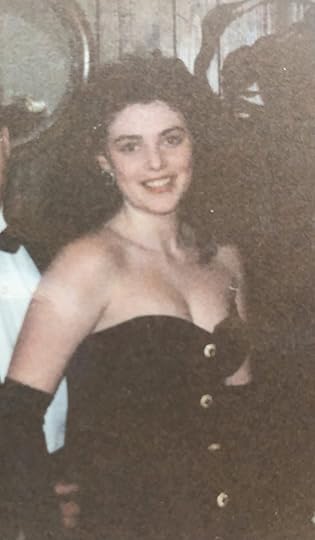
I wasn’t in a place to date…
My confidence and sense of self was at an all-time low.
I didn’t share these things with anyone. I think maybe at that time in my life, I was under the impression that I should have it “all together” because I thought the people around me did. I didn’t talk to my parents (because the confusion about dating, relationships, and sexuality weren’t discussed beyond the “religious” lens and often left me feeling guilty and confused). My friends had sort of exploded and we were shrapnel spread out, though not because of anything dramatic but rather the natural drifting on the winds of changing ideologies and exciting, new relationships. Add to it that I was embarrassed; I’d had sex for the first time with that long-term boyfriend, believing that relationship was going to be “forever”, and it was only weeks later he broke up with me.
I was the stereotype.
Sometime later, when a new boy asked me out—a friend—I agreed. I believed he was a nice guy, and I thought getting to know him a bit more was a good thing. He had a ready smile, a nice sense of humor, and was cute. We started hanging out more in the normal ways: spending time at school flirting and laughing, exchanging notes written on notebook paper in the hallway between classes, and talking on the phone (this is before cell phones). We even went out in a group setting several times before finally venturing out on a date between the two of us. I can’t even tell you where it was, but I know we ended up at his house to watch TV. Somehow, during the course of watching TV, we shared our first kiss.
It wasn’t great. There were no fireworks or butterflies. No chemistry at all.
My brain screamed: disengage! I pulled away from him, and because I’d been taught to be a nice girl and to spare another’s feelings, I did my best to extricate myself from the intimate situation with as much grace as I could muster. Only he didn’t read the cues. Instead, he grabbed my hand and put it on his junk; then he proceeded to hold my hand against him to try and force me to give him a hand job.
I said “no”, pulled away, and fled the scene (thankfully, I’d driven) disturbed by the events. Had I missed something? What had I done wrong? Did I make him think that was okay? I thought he was nice! Why had he tried to force me to do something like that?
The next day, I told him I didn’t like him in “that” way and hoped we could remain friends (current me scoffs and rolls her eyes). We didn’t. He was a jerk to me after. Rather than having the ability to see that he had been the one in the wrong—consent, nonexistent—I took his dismissal of me as my failure.
Fast forward to now—and without getting into the bigger issue of consent, sex assault, and the inappropriateness of my self-blame (because these are separate things)—the experience reminds me how important it is to be in a positive headspace as an individual when starting a new relationship. That doesn’t mean, of course, that people don’t bring experiences that hurt them, impact their sense of self, so on and so forth, into a relationship. That’s impossible. It also doesn’t mean that the right person potentially can support our growth through trauma. In this instance, however, I wasn’t in a healthy headspace to walk into a relationship with this immature, young man. My struggle to see my own worth provided me the perfect means to focus on my shortcomings rather than trust my instincts. I’d lost my sense of self, lost all my confidence in what I believed and what I thought I knew. I was grappling with guilt over my own sexuality and was in over my head without the tools necessary to advocate for myself, to be clear about what I deserved and wanted, as well as what kind of treatment to demand from a partner.
Hindsight is 20/20, of course.
Perhaps my hindsight can be your foresight.
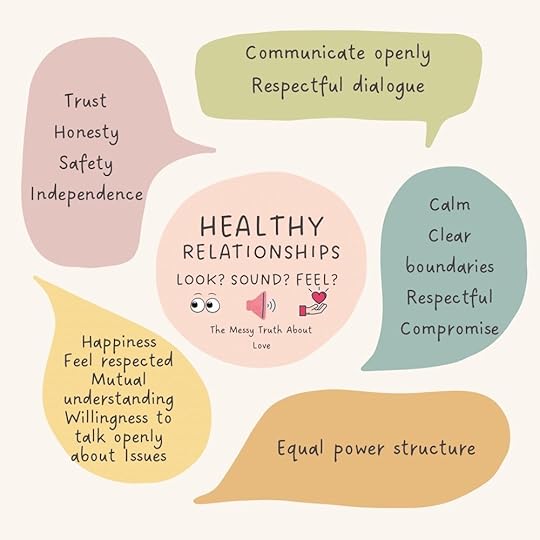
If I had access to a time machine and I could go back for a do-over, I wouldn’t have gone out with him in the first place. I would have thanked him for being my friend, but told him I wasn’t in a place to date anyone. The truth was, I didn’t have feelings beyond friendship for him, but I appreciated his attention considering the pain of being dumped and how raw I felt. A horrible combination. Had there been sparks or chemistry (thank goodness there weren’t, I was primed to accept the manipulation of a lovebomb or the eventual unhealthy stance of a possible abuser [not that this young man fit either of these descriptions, nor do I presume this is who he was beyond our failed date]). And, if I had had a mentor to offer advice, I hope they might have told me: Perhaps hold off on dating anyone until you navigate the feelings you're feeling about your ex and you deserve more than what you’re telling yourself.
The sad news is that I didn’t do any of those things, and this experience primed me for several more unhealthy relationships (current me is shaking her head). It’s embarrassing, but I don’t think I’m probably alone. On a positive note, however, if I could help to make the awful cycle stop, I’ll offer these mentorship tips now:
If you’re struggling with a break-up, hold off dating anyone. You need to reconnect to your inner-strength. Allow it to bloom and feed you before dating and sharing it with another.
Don’t allow someone else to determine your self-worth.
Expect more, not less.
Don’t make excuses for your partner, and recognize your feelings are valid.
Speak up. Stand up. Walk away (when the behaviors your partner exhibits are problematic, disrespectful, and/or isolating).
Don’t silence your inner-voice; trust your instincts.
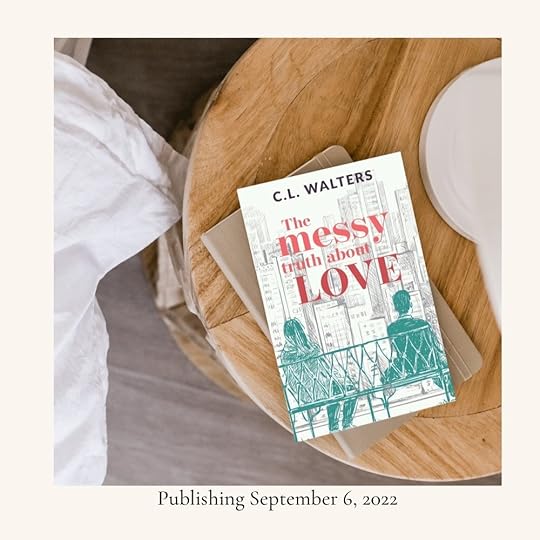
In the new book, The Messy Truth About Love, I get the opportunity to offer a contrast between what’s healthy in a relationship with an unhealthy version of one—a sort of mentor to my fictional characters (LOL). Hannah is two months removed from a relationship when she reconnects with her high-school-crush Seth in The Messy Truth About Love. I’m not sure she follows my six point advice here, but she’s on the mend as she runs into Seth, so we get to witness her grow through it with Seth as one of her mentors. This story had difficult moments to write, but important ideas, nonetheless. Be aware of trigger warnings before you pick it up (which I’ve published here, but there are spoilers). The Messy Truth About Love comes out September 6, and if you’re interested in some deleted scenes, here’s a link.
CLWalters Blog RSSJuly 27, 2022
Unhealthy Relationships and Romance Books
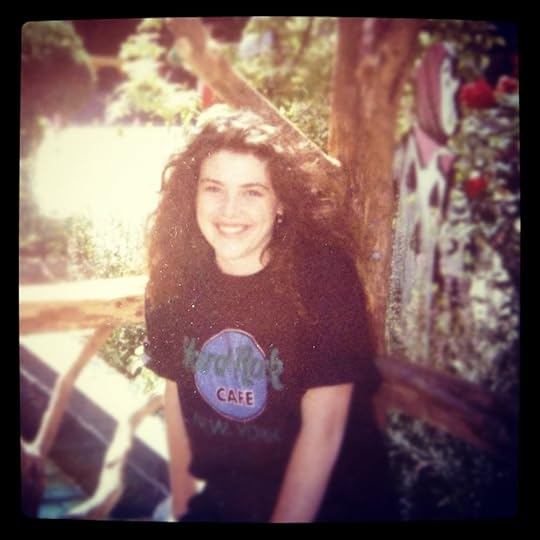
When I was 18 (this was in the early 1990’s), I was a small town girl living in a very conservative community where God, Family, and Country were the trifecta of life. Everyone had guns and used them for hunting season. It was commonplace to get married young—barely out of high school—to your high school sweetheart. All those beliefs perpetuated year after year. I say this to give you a frame of reference about my perspective at 18. I wanted to go to college, but I was the first one in my family to think about it. We didn’t have a lot of money or know-how about how to get there, but I did think: maybe there’s something else.
One thing I loved: reading.
We had one bookstore and a library. That’s where you could find me if I could find my way to either place.
As an adolescent, my favorite reads were romances. I started with the Sunfire Romances (long live the love triangle) and moved on to Sweet Valley High and Sweet Dreams books (oh the drama), and eventually I found my way to the adult romances reading Lavyrle Spencer and Judith McNaught (so that’s how sex works). I suspect that these readings shaped my belief system about my identity as it related to “romance” and relationships, though to be fair, I had an excellent model of a respectful relationship between my parents.

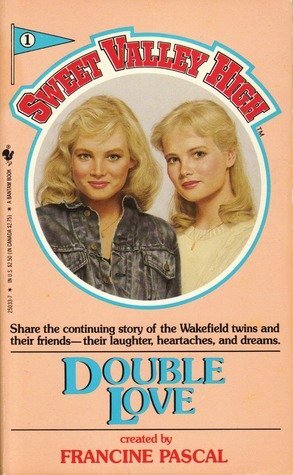
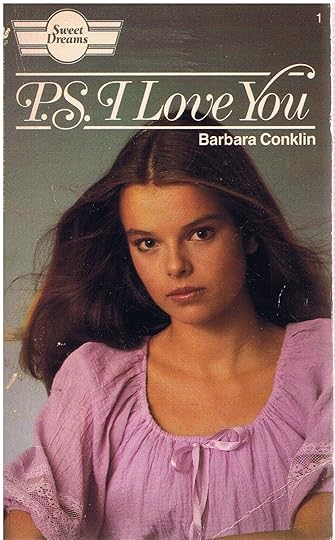
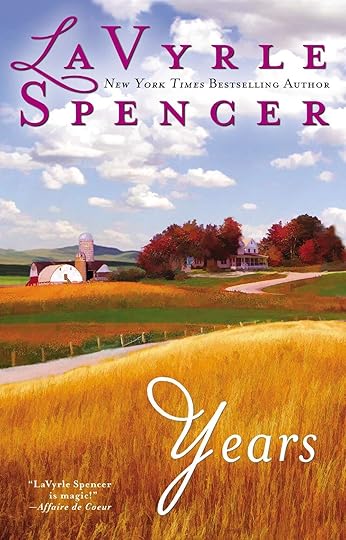
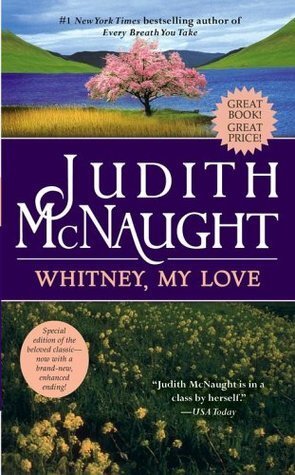
Like any adolescent, I was ready to test the waters of relationships, and that’s where things got skewed. My fundamentalist, church background—reinforced by my parents—insisted that I shouldn’t date until I was sixteen. When I did venture into the dating arena, I was given a “purity ring” to reinforce chastity (no sex until there was a “ring on it”, peeps) which also loaded on a heap of guilt when it came to experimentation. Finally, I had this “romanticized” version of what it meant to be in a relationship, and no clarity on what an unhealthy one looked like.
Fast forward to 2022.
I didn’t marry my high school sweetheart. I moved away from that small town. I did get to college by the skin of my teeth and graduated. I did marry my college sweetheart and have been a mother to two amazing kids. I got my masters, have worked with teens, and I still read.
Last year, I read the tiktok, booktok sensation Ugly Love by Colleen Hoover. It’s an entertaining book, and while I’m about to be critical of it; please know that this commentary isn’t a knock on the author or her ability to write a catchy book that draws a reader in. This is not that kind of criticism.
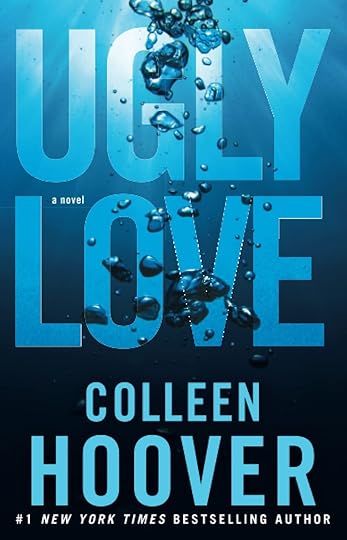
When I finished and set Ugly Love down, I walked away from it with my stomach in knots. At first I couldn’t figure out why. It’s about a young woman in her early twenties who’s starting over in a new place. She’s just gotten a job as a nurse and moves in with her brother as a stop-gap until she can find her own place. Living across the hall is her brother’s best friend. There’s a lot of sexual chemistry between them, and so they both consent to a relationship with “no strings.” Except, like most “sex-only” relationships, feelings happen. What ensues is a story highlighting an often unhealthy and manipulative relationship rooted in emotional bankruptcy and trauma. Like any romance read, it ends with the “happily-ever-after” but after reflecting on what had bothered me about it, I realized I had read a glorified version of “If I stick around, I can fix him”, and I felt so sad for 18-year-old me. Why? That girl would have taken the message to heart. I wouldn’t have been able to separate the “romanticized” ideals with reality, even knowing it was fiction.
Which then made me wonder: how many young women 18+ are reading books like Ugly Love (and believe me when I say there’s a lot of stories like this perpetuating a kind of “I can fix him” message) and taking to heart that message? Being set up to accept abusive behavior in a partner because it’s important to be “committed” or if she just “works harder”, then everything will turn out okay.
When I wrote The Stories Stars Tell, there was catharsis for me—the girl steeped in purity culture—to let go of those unhealthy messages about personal empowerment. I didn’t start the story knowing that was where it ended up. I didn’t start The Messy Truth About Love thinking that I would look at that unhealthy packaging of a relationship as “normal” and deconstruct it by reinforcing a healthy relationship. But that’s where it went.
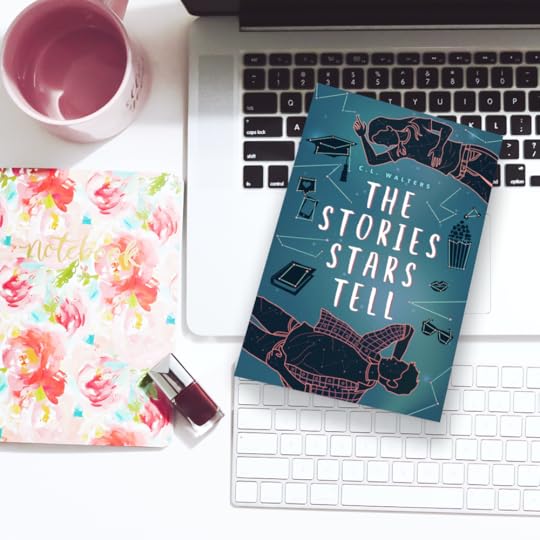

And so that’s what I hope readers are able to take away from The Messy Truth About Love. Sometimes we don’t know we're in an unhealthy situation until we’re able to step out of it and look back as we walk away. And maybe, just maybe, The Messy Truth About Love will be the story someone needs to see their own situation or prevent one. I can hope.




